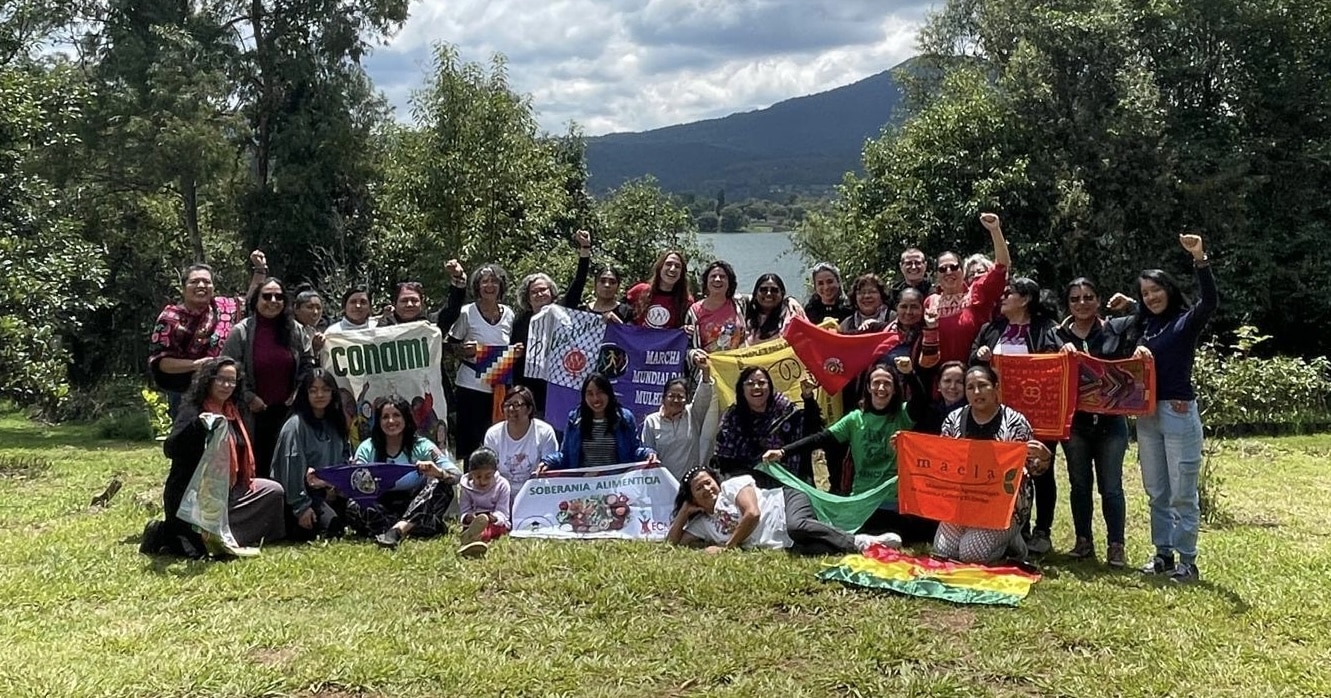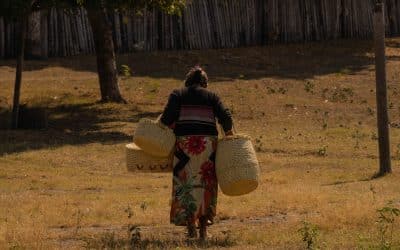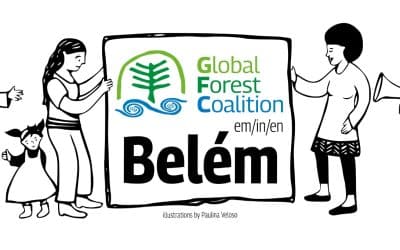[:en]
Women from around Latin America gathered to debate food sovereignty ahead of Nyéléni
By Inés Franceschelli, Heñói Centro de Estudios / Global Forest Coalition
July 22, 2025
More than 30 women peasant and Indigenous leaders and activists in defense of the environment participated in the second in-person meeting of the Women’s School of the Continental Alliance for Food Sovereignty in Latin America and the Caribbean (known as EMA in Spanish).
From July 18 to 21, we engaged in an intense debate on how to strengthen women’s political participation in defending the right to adequate food and nutrition.
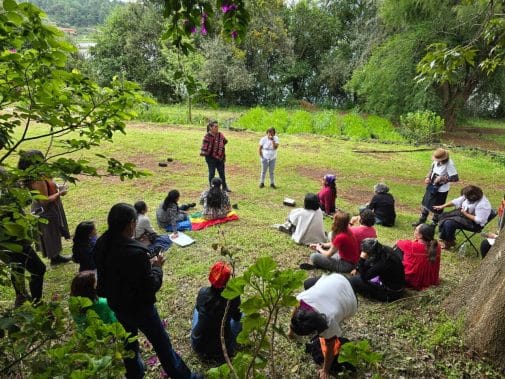
The Women’s School aims to strengthen the activist struggles of women in its networks to advance the search for a new food paradigm that overcomes the current global, capitalist, colonial, racist, and patriarchal agri-food system.
The discussions were focused on two main themes:
- The need to converge and unify our approach in order to influence our own networks and decision-making spaces at the local, national, regional, and global levels.
- Care work—generally undertaken by women in all their diversity—as a fundamental part of the fight against extractivism and a source of strength for resistance.
The participants represented the various networks that make up the Continental Alliance: CLOC-La Vía Campesina, Latin American Agroecological Movement (MAELA), FoodFirst Information and Action Network (FIAN), Continental Network of Indigenous Women (ECMIA), World March of Women, Friends of the Earth Latin America and the Caribbean (ATALC), International Indian Treaty Council (CITI), Movement for the Right to Health, World Forum of Fisherfolk, Global Forest Coalition (GFC), among others. Voices were heard from Mexico, Costa Rica, El Salvador, Nicaragua, Brazil, Panama, Paraguay, Bolivia, Argentina, Guatemala, Colombia, and Ecuador.
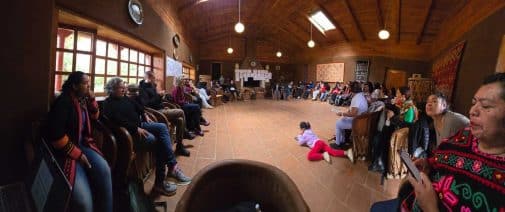
Some of the participants will carry the voices of the region to the Third Nyéléni World Forum of the International Movement for Food Sovereignty, to be held in Sri Lanka in September 2025. This forum will bring together Indigenous peoples, peasants, fisherfolk, workers, pastoralists, feminists, grassroots environmentalists, migrants, nomadic peoples, impoverished urban populations, social and solidarity economy activists, popular health activists, consumers, researchers, and artists. Together, they are organizing to build a common political agenda for popular power and the transformation of the capitalist, patriarchal, imperialist, colonialist, racist, classist, and supremacist system.
The Nyéléni Forum is part of a process of movements and organizations that share values and a political vision that encompasses food sovereignty and agroecology, popular feminism, sovereignty and self-determination of peoples over their territories, social, economic, environmental, and health justice, feminist economics, and internationalist solidarity. It is a process free from discrimination and harassment that seeks to build unity for action from diversity, based on knowledge sharing. It recognizes the indivisibility of society and nature and embraces the spiritual principle underlying the perspectives of Indigenous peoples, for whom the protection of Mother Earth is fundamental.
Latin America has a lot to contribute to global grassroots movements for food sovereignty, and our movements will in turn be nourished by the many examples of women’s struggles for collective liberation and wellbeing at Nyeleni.
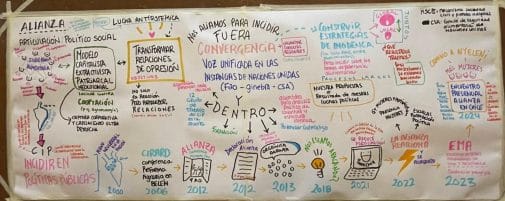
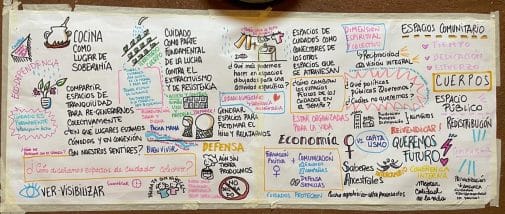
Mujeres de diversos países de América Latina se reunieron para debatir sobre la soberanía alimentaria antes de Nyéléni
Por Inés Franceschelli, Centro de Estudios Heñói / Coalición Mundial por los Bosques
22 de julio de 2025
Más de 30 lideresas campesinas e indígenas, activistas en la defensa del ambiente, participaron del segundo encuentro presencial de la Escuela de Mujeres de la Alianza Continental por la Soberanía Alimentaria de América Latina y el Caribe (EMA).
Del 18 al 21 de julio México fue sede de un intenso debate sobre cómo fortalecer la participación política de las mujeres en la defensa del derecho a una alimentación y nutrición adecuadas.

La Escuela de Mujeres de la Alianza está orientada a fortalecer las luchas de las mujeres de las redes que la componen, en la búsqueda de un nuevo paradigma alimentario que supere el actual sistema agroalimentario global, capitalista, colonial, racista y patriarcal.
Los debates se centraron en dos grandes ejes:
- la necesidad de converger y unificar el enfoque para la incidencia hacia nuestras propias redes y hacia los espacios de toma de decisiones, a nivel local, nacional, regional y global; y
- los cuidados, en general asumidos por mujeres en toda su diversidad, como parte fundamental de la lucha contra los extractivismos y de la fuerza para las resistencias.
Las participantes trajeron la representación de las diversas redes que conforman la Alianza Continental: CLOC – La Vía Campesina, Movimiento Agroecológico Latinoamericano (Maela), FoodFirst Information and Action Network (FIAN), Enlace Continental de Mujeres Indígenas (ECMIA), Marcha Mundial de las Mujeres, Amigos de la Tierra América Latina y el Caribe (ATALC), Consejo Internacional de Tratados Indios (CITI), Movimiento por el Derecho a la Salud, Foro Mundial de Pescadores, Global Forest Coalition (GFC), entre otras. Se escucharon acentos de México, Costa Rica, El Salvador, Nicaragua, Brasil, Panamá, Paraguay, Bolivia, Argentina, Guatemala, Colombia y Ecuador.

Algunas de las participantes llevarán las voces de la región al Tercer Foro Mundial Nyéléni, del Movimiento Internacional por la Soberanía Alimentaria, que se realizará en Sri Lanka, en septiembre de 2025. Este foro reunirá a pueblos indígenas, campesinxs, pescadorxs, trabajadorxs, pastorxs, feministas, ambientalistas de base, migrantes, pueblos nómadas, poblaciones urbanas empobrecidas, activistas de la economía social y solidaria, activistas por la salud popular, consumidorxs, investigadorxs y artistas, organizadxs para construir una agenda política común para el poder popular y la transformación del sistema capitalista, patriarcal, imperialista, colonialista, racista, de castas y supremacista.
El Foro Nyéléni es parte de un proceso de movimientos y organizaciones que comparten valores y una visión política que abarca la soberanía alimentaria y la agroecología, el feminismo popular, la soberanía y autodeterminación de los pueblos sobre sus territorios, la justicia social, económica, ambiental y sanitaria, la economía feminista y la solidaridad internacionalista. Es un proceso libre de discriminación y acoso que busca construir unidad para la acción desde la diversidad, basado en el diálogo de saberes. Reconoce la indivisibilidad entre la sociedad y la naturaleza y abraza el principio espiritual que subyace a las perspectivas de los pueblos indígenas, para quienes la protección de la Madre Tierra es fundamental.
América Latina y el Caribe tiene mucho que aportar a los movimientos populares mundiales de soberanía alimentaria, y nuestros movimientos se nutrirán a su vez de los numerosos ejemplos de luchas de las mujeres por la liberación colectiva y el bienestar representados en Nyéléni.


Des femmes de différents pays d’Amérique latine se sont réunies pour débattre de la souveraineté alimentaire avant Nyéléni
Par Inés Franceschelli, Centre d’études Heñói / Coalition mondiale pour les forêts
22 juillet 2025
Plus de 30 femmes leaders paysannes et autochtones, militantes pour la défense de l’environnement, ont participé à la deuxième rencontre en présentiel de l’École des femmes de l’Alliance continentale pour la souveraineté alimentaire en Amérique latine et dans les Caraïbes (EMA).
Continuer en anglais…
Du 18 au 21 juillet, le Mexique a accueilli un débat intense sur les moyens de renforcer la participation politique des femmes dans la défense du droit à une alimentation et à une nutrition adéquates.
The Women’s School aims to strengthen the activist struggles of women in its networks to advance the search for a new food paradigm that overcomes the current global, capitalist, colonial, racist, and patriarchal agri-food system.
The discussions were focused on two main themes:
- The need to converge and unify our approach in order to influence our own networks and decision-making spaces at the local, national, regional, and global levels.
- Care work—generally undertaken by women in all their diversity—as a fundamental part of the fight against extractivism and a source of strength for resistance.
The participants represented the various networks that make up the Continental Alliance: CLOC-La Vía Campesina, Latin American Agroecological Movement (MAELA), FoodFirst Information and Action Network (FIAN), Continental Network of Indigenous Women (ECMIA), World March of Women, Friends of the Earth Latin America and the Caribbean (ATALC), International Indian Treaty Council (CITI), Movement for the Right to Health, World Forum of Fisherfolk, Global Forest Coalition (GFC), among others. Voices were heard from Mexico, Costa Rica, El Salvador, Nicaragua, Brazil, Panama, Paraguay, Bolivia, Argentina, Guatemala, Colombia, and Ecuador.
Some of the participants will carry the voices of the region to the Third Nyéléni World Forum of the International Movement for Food Sovereignty, to be held in Sri Lanka in September 2025. This forum will bring together Indigenous peoples, peasants, fisherfolk, workers, pastoralists, feminists, grassroots environmentalists, migrants, nomadic peoples, impoverished urban populations, social and solidarity economy activists, popular health activists, consumers, researchers, and artists. Together, they are organizing to build a common political agenda for popular power and the transformation of the capitalist, patriarchal, imperialist, colonialist, racist, classist, and supremacist system.
The Nyéléni Forum is part of a process of movements and organizations that share values and a political vision that encompasses food sovereignty and agroecology, popular feminism, sovereignty and self-determination of peoples over their territories, social, economic, environmental, and health justice, feminist economics, and internationalist solidarity. It is a process free from discrimination and harassment that seeks to build unity for action from diversity, based on knowledge sharing. It recognizes the indivisibility of society and nature and embraces the spiritual principle underlying the perspectives of Indigenous peoples, for whom the protection of Mother Earth is fundamental.
Latin America has a lot to contribute to global grassroots movements for food sovereignty, and our movements will in turn be nourished by the many examples of women’s struggles for collective liberation and wellbeing at Nyeleni. [:]

